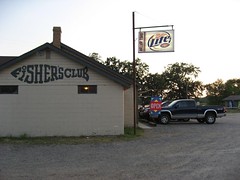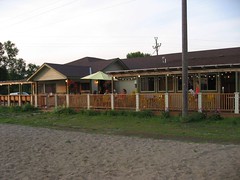live blogging at WiLSWorld
a few notes before the morning session starts: Back at the Pyle Center in Madison Wisconsin. I (as well as the other Minnesota librarians here) didn’t go to the membership meeting. Went to the bookstore – stocked up on Bucky Badger T-shirts (Wisconsin native that I am).
Lots of energy here. Still lots of Hawaiian shirts (wonder if they washed them? – or have 2?)
Restaurant recommendation – Porto Bella last night was one of the best Italian restaurants I’ve ever been to.
Brave New Online Worlds: Social Networks, Online Communities, and Multi-User Virtual Environments
Tom Peters, TAP Information Services
a visual – Tom: no Hawaiian shirt, pretty green lei. An LJ Mover and Shaker
Second Life avatar – Maxido Ricardo (sp????)
Newsflash — it’s raining in Madison!!!!!!
Last night was leading a book discussion in Second Life.
No snappy title, title like a dissertation
Going to be predicting the future
Living in volatile times for libraries. What about relevance of librarianship.
www.tapinformation.com/WiLSWorld200707.htm (slides will be posted)
Rule #1 – don’t try to predict the future because you usually will be proven wrong
Behooves us to notice what changes are happening in world of our users
fairy tales to get at basic human tendancies
“hare” is human imagination. when confronted with a new technology we often race ahead in our minds to what seems to be plausible conclusions and outcomes.
“tortoise” is human lived experience.
it often takes years for reality to catch up to human imagination
unrealized vision of paperless society
nearly all information is now created in digital format
Standford study – 95% of information being created is being created digitally
Henny Penny Syndrome
sky is falling
some new technology is going to kill libraries and librarianship
HPS is caused by the Hare and Tortoise phenomenon
example – E-mail lists did not kill conference attendance
needed: a henny penny meter
henpenomemter or HPM for short
measures the henny penniness of our collective response to technological development
web initially had a low HPM score, but it has risen since
Google Mass Digitation had a high HPM score, but falling
thesis: many don’t see an important relationship between libraries & social networks, online communities, and virtual worlds (example Marshall Breeding)
nevertheless, TP thinks they could have a significant effect
(asked if anyone is twittering him – makes him nervous if people are twittering or blogging him)
Individuals, communities, libraries
Communities
lots of things get called communities
shared environment, interests, needs
communities often support “public goods” – libraries, schools, parks
Our social response to public goods has been changing (not the same as it was in the ’50s)
eg – charging an entry fee to a national park
Libraries serve communities
any library has potential user population, as well as user populations
some innovative libraries create communities
are we capable of creating communities in online environments?
talking about twittering – examples about how people might be having a twittering conversation about what speaker is saying
TP not sure what friendship means online. It’s a different kind.
not an either-or situation (online versus earthly communities)
see Castronova’s 2005 book, Synthetic Worlds
we ignore, at our peril, the economies of virtual worlds (Castronova)
impact on funding for libraries could really affect us
communities summarized:
earthly: general, localized population
Virtual: specialized, global population
Social Networks
basic concepts: nodes and ties
he says Illinois takes the cake for overlapping consortia
Online Social Networks
Facebook
MySpace
LibraryThing
Flickr
Flirtomatic
Twitter
Second Life
LibraryThing community sprang out of nothing
Online communities spring up because of something else someone is trying to do
TP is a reference librarian in Second Life (Monday nights)
Flickr has evolved into a community
not used Flirtomatic
had dinner with someone who got 20 Twitters during dinner. she demonstrated that there’s a lot of value in it for her.
What’s happening to the individual
***coming struggle between the individual and the group
smart mobs
wisdom of crowds – disturbing to TP. infers that even an expert is not as smart as the average of the crowd
online communities
Attemts to tap into group power
Communism (political, economic, social)
Trade Unions (economic, polical, social)
Wisdom of Crowd (informational, economic, social)
An aside: blogs vs. wikis
Blogs about individual mind. accumulate and present knowledge sequentially.
Wikis are about collective intelligence. present knowledge communially.
wikis leave out the distillation of process of looking up 5 sources (eg)
Future of the indivual
Individuals already operate in several communities (work, home, professiona., avocational, etc.)
Individual self will span severalenvironments (earth, web, virtual worlds). People will draw information from varying sources in several environments.
Indivudal may become subserviant in new ways to groups.
what does all have to do with libraries
libraries serve communities by supporting individuals
support geographically constrained communities
libraries funded locally
end of romantic library?
relationship between indivual and group
romantics put individual on a pedestal
all creativity comes from individual
western culture had a romantic movement.
can’t get our minds around balance of power between society and indivual
frontier spirit has a lot to do with romantic (indivualistic) spirit
romantic library
focuses on indivuals
quiet place for silent & reflection
do not directly foster community
diffuses knowledge
foster indivual exptertise
Rustication of Expertise
rusticated – sent away from university to think about it
in future experts associated with universities may decline
importance of indivual expertise to the advancement of humanity may actually decline in the near future
cites Michael Gorman – may believe romantic view of library right for past and future
want to be unsettled? David Weinberger, Everything is Miscellaneous
knowing and knowledge may become group process
knowledge through conversation
library as conversation
usage/funding disconnect
library patrons don’t care about geographic boundaries. in usage patterns, they’re already there
USAGE GLOBAL, FUNDING LOCAL
have to deal with
Virtual Worlds
3-D worlds
populated by avatars
like & unlike the Real World
second life
teen second life
Whyville
ActiveWorlds
Max his dog is inspiration for his avatar
real world libraries: detente between people and paper (% of humidity)
most info interaction has been 2-dimensional
Virtual libraries are 3D. makes senses for people. Will eventually be for information.
emphasis on digital objects persisted through the transition from print to digital
in virtual worlds, events and exhibits seem more than than collections.
all about the experience
what kind of library will it be if it’s more about events and exhibits than collections??????????
What is King?
content?
Community?
Conversation?
Experience? (Steven Abram)
what should li
braries do?
address the usage/funding disconnect
embrace library 2.0 tools and concepts as if no tomorrow
build and test prototype information experiences (about experience and not objects)
Brave new world?
from multi-tasking to multi-worlding
from romantic libraries to communal knowledge repositories
task
apply trends and affordances of online communal networks to the enduring mission of libraries
avoid henny pennyishness
social mores very different in vertual worlds
Reference in 2nd Life, replicating the reference service in physical
very expensive, labor intensive
average age of people with 2nd life avatars are 33
this is the way of people getting out (don’t need babysitter for small children)
We don’t understand browsing as a behavior. In an area of rich browsing environment, you slow down. Browsing in an ambient information environment, interacting with it.


